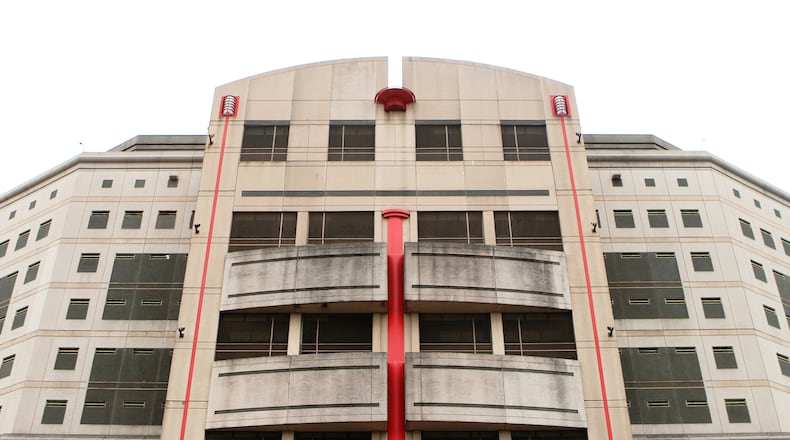On his fourth day in office, Fulton County’s new sheriff reignited discussions about purchasing the city of Atlanta’s mostly empty downtown jail. But Mayor Keisha Lance Bottoms has vowed to close and “reimagine” the jail, and her administration is still moving forward with those plans.
Sheriff Patrick Labat — fresh off an August election win over the incumbent sheriff — announced last week that buying Atlanta City Detention Center is key to his plans of keeping the community safe. Activists say that idea flies in the face of Bottoms’ promise to turn the jail into an equity center.
“Labat believes the City of Atlanta’s plan to close ACDC, when crime is rising, sends the wrong message to criminals and the community at large,” according to a Jan. 4 press release from the sheriff’s office.
In a statement to The Atlanta Journal-Constitution, a spokesman for the mayor’s office didn’t explicitly address Labat’s proposal. But he said Bottoms’ “commitment to closing and reimagining [the detention center], as well as overall justice reforms, remains.”
In press releases and speeches, Bottoms has touted her plans for the jail as one of her administration’s central criminal justice reform initiatives.
Local activists are supportive of Bottoms’ promise to close the city jail, but say she might face criticism from those in the Buckhead business community who feel she hasn’t been tough enough on crime.
‘Anticipated increase’
Fulton’s recent history with its jail has been rocky — and expensive.
The 2,500-bed jail on Rice Street was under federal oversight for 11 years because inmates slept on the floor due to overcrowding, raw sewage flooded cells and inmates wandered because of faulty locks. Though Fulton has spent $1 billion to repair the facility and won back full control, overcrowding remains a concern.
Acquiring the detention center would ensure Fulton can “manage the anticipated increase in jail population once the courts reopen to the public ... and the district attorney’s office resumes prosecuting cases,” according to Labat’s press release. Labat’s office did not respond to further questions about why he wants to buy the jail.
Credit: Elijah Nouvelage
Credit: Elijah Nouvelage
About four miles away on Peachtree Street, the Atlanta jail can house up to 1,300 low-level inmates, but its average daily intake is about 25 to 30. City officials have acknowledged that continuing to operate the jail is a burden on taxpayers, costing $16.5 million in fiscal year 2021.
Several of Bottoms’ criminal justice reform efforts — including the elimination of cash bond and the termination of a contract to hold U.S. Immigration and Customs Enforcement detainees — have reduced the jail’s population over the last several years.
In 2019, Bottoms created the 52-member task force to come up with ways to close and repurpose the jail. A 26-page report was submitted in June.
Labat at the time ran the detention center and sat on the task force, which recommended the city demolish the jail and build a “Center for Equity” that would focus on providing services and resources to residents.
‘Slap in the face’
Task force co-chair Marilynn Winn thinks it unlikely that the city will sell the jail, but said it makes sense that Labat wants it: “He’s a jailer and jailers think people should be in jail. They know no other way.”
Winn founded the nonprofit Women on the Rise, which works to reduce the number of incarcerated women.
Bottoms’ administration plans to present the “next steps” for closing the jail at a council work session tentatively scheduled for later this month, according to a press release.
After a year of discussions about reimagining the role of policing, criminal justice advocates are pushing for Bottoms to follow through on her promise of closing the jail. About two hours of public comment during a City Council committee meeting Monday included many people urging the city to not to sell its jail.
Xochitl Bereva, a task force member and director of Racial Justice Action Center, called Labat’s attempt to buy the jail a “slap in the face.”
”Not just to the mayor, but the incredibly thorough community effort that’s been working toward a plan for a long time.”
So why would Labat use his first days in office and new political power to push for something that may not happen? Winn said it could stem from concerns of Buckhead constituents.
Fulton County Commissioner Lee Morris, a former Atlanta councilman whose county district now covers all of Buckhead, said his neighbors are worried about crime, and how quickly accused offenders can get out.
City and county officials have discussed Fulton buying the detention center since former Mayor Shirley Franklin’s administration, but those talks fell through time and again.
The idea has come up more recently. A week after Bottoms announced her desire to close and repurpose the jail building in 2019, Mary Norwood, who narrowly lost the 2017 mayoral race to Bottoms, publicly called for it to be sold to Fulton County. Norwood now chairs the Buckhead Council of Neighborhoods.
Morris said internal talks at the county indicate a willingness to use part of the building to help those with behavioral health or substance abuse issues. He said he believes the county should buy the detention center because it would save time and money, as opposed to housing inmates in far-flung jails.
“Would it really solve the crime problem? I’m not really sure it would. It would only if it meant we were going to keep the arrestees in jail until trial more than we do now,” he said.
Credit: WSBTV Videos
The Latest
Featured





